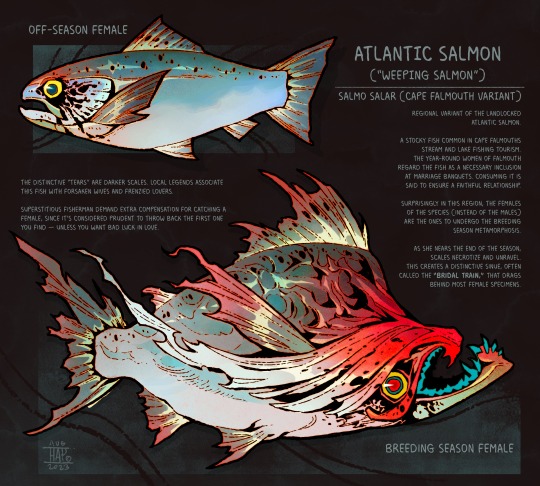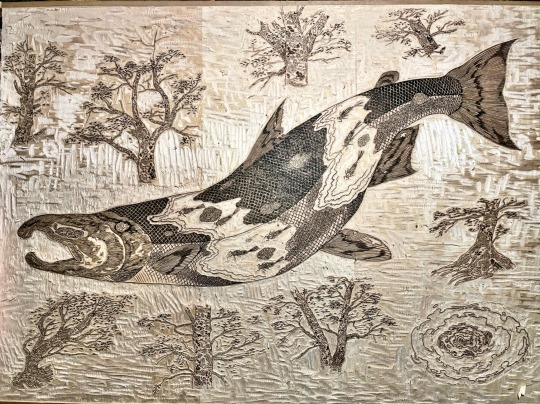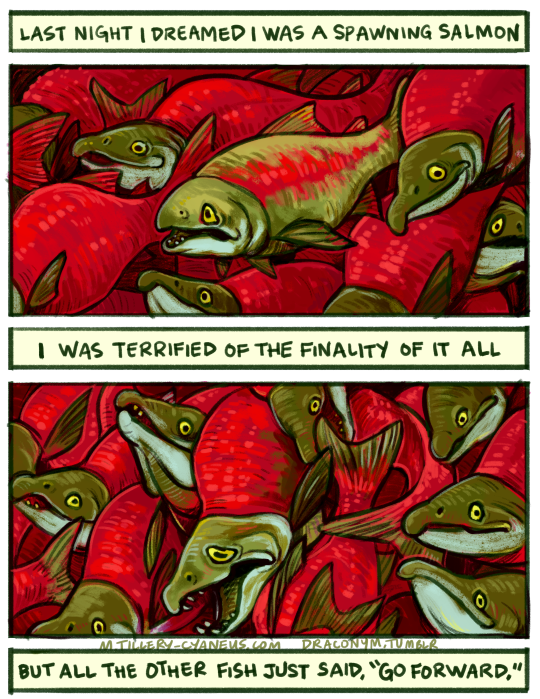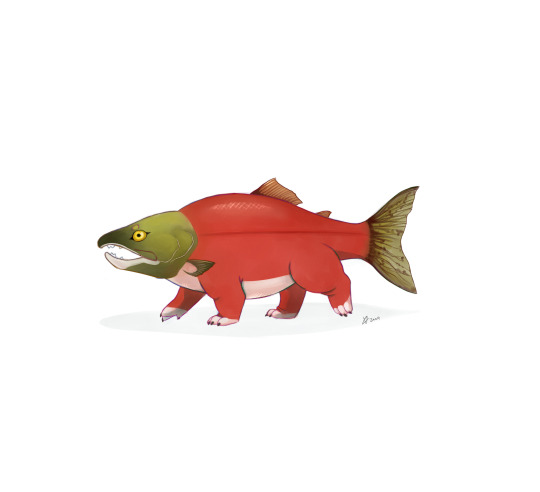#Salmon
Explore tagged Tumblr posts
Text



YOU SHOULD HAVE BEEN THERE
#digital art#digital illustration#illustration#artists on tumblr#sockeye salmon#salmon#landscape#landscape art#clip studio paint#nature#sea life#ocean#stars#nocturnal#drawing#digital painting#PLEASE FULL VIEW THIS PLEASE
14K notes
·
View notes
Text

Cape Falmouth’s “Weeping Salmon"
#kodasea#own art#2023 art#art#artists on tumblr#digital art#digital artist#digital artwork#digital drawing#digital illustration#procreate#procreate art#procreate artwork#procreate illustration#procreate drawing#animal art#animal studies#creature design#creature art#fish art#salmon#fish#cold case crew#cape falmouth#original species#weeping salmon#What happens when you play Dredge#In all seriousness I was playing with worldbuilding for my story via the local animals and how they factor into the Cape Falmouth culture#They're kind of characters in their own right and a big goal of mine is to make the town feel like a living being#Extremely fun would definitely recommend!
1K notes
·
View notes
Text
Bruschettas
🥓🍅🍋

Patreon
168 notes
·
View notes
Text

the flesh will persist (graphite & digital, 2023)
#salmon#zombie salmon#freshwater fish#nature#graphite#traditional art#my art#animal death#id in alt text#been thinking a lot about how salmon can start to decompose while they are still alive
18K notes
·
View notes
Text


Fish Snack
#my art#art#digital art#digital illustration#therian#furry#coastal wolf#wolf#wolf art#alterhuman#animal art#animal illustration#tw animal injury#tw carnivore#salmon#fish#fish art
51 notes
·
View notes
Text

Just some fish I drew while I was sick. I haven't been able to go out much, so I had to draw some nature. Even though I only ever see bass and catfish, while these are all salmon.
#art#art style#artists on tumblr#artwork#digital art#drawing#my art#artist#fish#appalachia#south#southern#fishing#aquatic life#sea creatures#fish scales#fishblr#fishes#salmon#bass#fishposting#rural#rural america
37 notes
·
View notes
Text

7 months of carving coming to an end, I lost some details and added some. I love and need to see the prints, but honestly, the block is the final art piece for me. It’s what I spend all my time with and each one has a segment of my life attached with it.
Shina woodblock
#nature#art#california#mendocino#sonoma#bay area#ink#printmaking#illustration#mokuhanga#ukiyoe#woodblock print#forest#木版画#picoftheday#relief print#trees#woodblock#alders#salmon#fish#coho
9K notes
·
View notes
Text
i can eat a sandwich in the morning
28 notes
·
View notes
Text

Beautiful salmon swimming together
Photography series titled “No Pebble Mine” by Robert Glenn Ketchum
#fishblr#fishposting#fish irl#fish photography#salmon#salmon photography#I haven’t been posting much fish art lately#but I will return I have to search the archives
730 notes
·
View notes
Text

Not a big fan of what melatonin has been doing to my dreams lately.
115K notes
·
View notes
Text

Funniest picture on iNaturalist
19K notes
·
View notes
Text




🎣THE FISH MARKET IS OPEN🎣
Today's catch is Atlantic Salmon!
Handmade with 100% wool felt, only 3 are available and will be made to order!
Bisonwares.com
26K notes
·
View notes
Text

Sockeye salmon, if he was just a little buddy
#art#artist of tumblr#artist on tumblr#queer artists#ghcstcd#digital art#illustration#queer art#animals#fish#salmon#sockeye salmon#sockeye#creature#fantasy#marine life#marine#nature#marine animals#he can even do tricks :) like roll over in the water#jump real high in water#and then laying on his side and snoring on land!#so talented!#artist#artwork#drawing
24K notes
·
View notes
Text

"Oh look love, how you've changed me."
New for the BOXED series, the salmon! Available now on my INPRINT!
12K notes
·
View notes
Text


That day I woke up crying
Inspired by this article, which caught in my throat for a good while.
#mine#artists on tumblr#my art#words#drawing#illustration#visual poetry#artwork#comic#original comic#comic art#salmon#climate change#fish#digital art#writing#poetry#words words words#poem#wordstag
18K notes
·
View notes